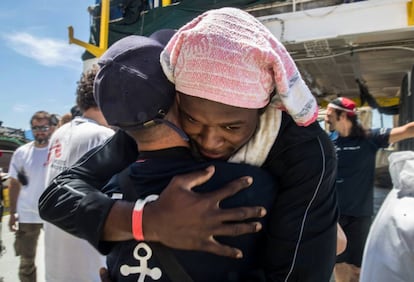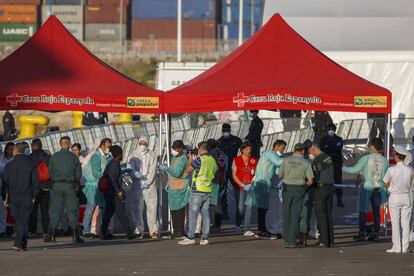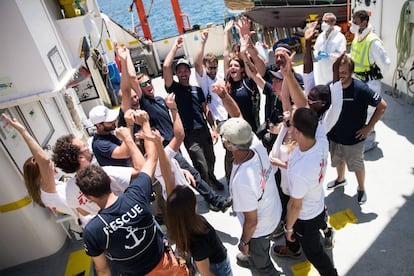Migrants on board ‘Aquarius’ granted 45-day special permit to stay in Spain
The 630 people who were turned away by Italy and Malta arrived in Valencia on Sunday to a crowd of 2,300

The 630 migrants who were rescued by the humanitarian ship Aquarius and turned away by Italy and Malta have been granted special permission to stay in Spain for 45 days. The news comes after the immigrants arrived in Valencia on Sunday on three vessels after an arduous eight-day journey at sea.
Under Spanish law, people who are caught trying to enter the country illegally are considered irregular migrants and subject to deportation. Some are detained at migrant holding centers (CIEs) for a maximum of 60 days and then released if the repatriation orders have not been processed, while Moroccans and Algerians are deported immediately by virtue of bilateral agreements with those countries.
It was a wake-up call for all EU countries to stop looking the other way and start looking for common solutions
Spanish Interior Ministry
The 1,290 migrants who landed on Andalusian shores over the last few hours, for instance, will be subject to deportation if authorities can determine their identity and country of origin and arrange for their expulsion within the legal time frame.
But the people aboard the Aquarius are not considered irregular migrants, as they are in Spain on an official invitation from the government for humanitarian reasons. They will receive a 45-day residency permit, after which the law will consider each individual’s case. All 630 of them are entitled to request asylum.
Sources at the Interior Ministry said that welcoming the Aquarius was “a humanitarian, extraordinary decision,” and also a political gesture. “It was a wake-up call for all EU countries to stop looking the other way and start looking for common solutions,” said a ministry spokesperson.

But this should not be construed as a change to Spanish immigration policy, said the spokesman, underscoring that the Aquarius was an exceptional case.
“It was a ship adrift, unable to dock anywhere, with people at the end of their tether, almost out of fuel and food, with children and pregnant women on board,” he said.
Shipwrecked

“The law considers that people who arrive on our shores in rubber dinghies are entering Spain illegally. In the case of the Aquarius, they are shipwrecked people who were picked up at sea, and they are authorized to enter,” explains Francisco Solans, a lawyer who specializes in immigration issues.
“It benefits Spain’s image and it represents change,” adds Javier de Lucas, director of the Human Rights Institute at Valencia University. “But at the same time (Spanish authorities) do not want to stray from the small margin granted by European immigration policy. It is contradictory, and that’s why they are weighing each step carefully. That is why they are clinging to the humanitarian argument.”
Emotional arrival
The migrants aboard the Aquarius and two Italian ships that made the journey together were overwhelmed with emotion when they reached the port of Valencia on Sunday.
“Thank you, thank you, thank you very much,” said a tearful man who identified himself simply as J., as he said goodbye to the team of rescuers and medical workers who saved his life.

Another migrant named Mok had written “I trust Spain” across his T-shirt.
Spanish medical staff and Civil Guard officers awaited on land while the members of Doctors Without Borders (MSF) and SOS Mediterranée said goodbye to each immigrant individually, exchanging hugs and good wishes.
By the time the Italian coast guard ship the Dattilo was seen entering the port ahead of the other two vessels at around 6.20am, there was already a contingent of around 2,300 people waiting for them on the quayside, including volunteers, translators, doctors, police officers and more than 100 reporters.
Health officials dressed in white suits, blue gloves and face masks were the first to board the ships to check for signs of infectious diseases, and several passengers were given face masks to wear. Five of them were brought down in wheelchairs, and many were suffering from burns caused by the combination of seawater and fuel, said Jorge Suárez, deputy director of emergencies for the Valencia government.
“I am happy, they are going to take care of us. Our life is not easy,” said one of the migrants, Ibrahim.
Five of the migrants were brought down in wheelchairs, and many were suffering from burns caused by the combination of seawater and fuel
The first people to walk out of the Aquarius were two young men who were crying as they embraced doctors and rescuers. “Goodbye, my friend,” said Aoife, an Irish nurse on the ship. “Au revoir, mon amie,” added a rescuer named Ludo.
English version by Susana Urra.
Tu suscripción se está usando en otro dispositivo
¿Quieres añadir otro usuario a tu suscripción?
Si continúas leyendo en este dispositivo, no se podrá leer en el otro.
FlechaTu suscripción se está usando en otro dispositivo y solo puedes acceder a EL PAÍS desde un dispositivo a la vez.
Si quieres compartir tu cuenta, cambia tu suscripción a la modalidad Premium, así podrás añadir otro usuario. Cada uno accederá con su propia cuenta de email, lo que os permitirá personalizar vuestra experiencia en EL PAÍS.
¿Tienes una suscripción de empresa? Accede aquí para contratar más cuentas.
En el caso de no saber quién está usando tu cuenta, te recomendamos cambiar tu contraseña aquí.
Si decides continuar compartiendo tu cuenta, este mensaje se mostrará en tu dispositivo y en el de la otra persona que está usando tu cuenta de forma indefinida, afectando a tu experiencia de lectura. Puedes consultar aquí los términos y condiciones de la suscripción digital.








































